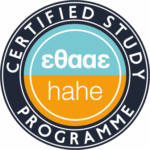MSc in Public Health and Epidemiology
Distance Learning
Public Health and Applied Epidemiology (Stream 1)
Public Health and Maritime Transport (Stream 2)
| Mode of delivery | Distance learning • Virtual online methods • No travel to Greece is required |
|---|---|
| Duration | Full time: 2 years Part time: 4 years |
| Total credits (ECTS) | 120 |
| European Qualification Framework (EQF) Level | Masters (MSc) Level 7 |
| Award title | MSc in Public Health and Applied Epidemiology or MSc in Public Health and Maritime Transport |
| Language of study | English |
| Awarding body | University of Thessaly (UTH), Greece |
| Faculty – Teaching institution | Faculty of Medicine – Laboratory of Hygiene and Epidemiology |
Programme information
The COVID-19 pandemic has demonstrated more than ever in recent history the importance, significance and necessity of public health across all disciplines and human activities.
Qualified public health professionals can play a vital role in promoting health, preventing, mitigating and controlling diseases.
The Postgraduate Program aims to provide high-level education to researchers and professionals for the protection of public health, which are based on the scientific areas of epidemiology, biostatistics, hygiene, health education, environmental health and management of human resources that are affected or affect the above.
The programme responds to the increased demands for specialists in Europe and around the world in order to promote public health and prevent the transnational spread of diseases, but also in particular to ensure public health and hygiene both on board ships and at their destinations.
The program is complementary to the undergraduate studies provided by Departments of European Universities and other countries, covering the gap that exists in the education provided at national, European and international level.
You will be selecting a top-ranked university, with a Medical Faculty renowned for its academic teaching and research capacity, and whose Laboratory of Hygiene and Epidemiology is recognized internationally, across Europe and nationally for its contribution to public health issues in general and specifically for the transport sectors and points of entry (ports, airports, ground crossings).
- The Laboratory of Hygiene and Epidemiology:
- is established at the University of Thessaly, Faculty of Medicine
- is affiliated with the University General Hospital of Larissa as a cross-departmental unit
- functions as a Peripheral Public Health Laboratory under the National Public Health Organization of Greece (NPHO)
- is designated as a World Health Organization (WHO) Collaborating Centre for the International Health Regulations: points of entry (WHO Reference: GRE-27)
- has established and operates a Public health observatory in means of transport and points of entry, whose scope addresses teaching and research needs in the subjects of public health in means of transport and points of entry.
- The Laboratory has a long history in teaching and research in the field of public health:
- It is responsible for teaching four courses of the medical studies programme since 2007
- It operates since 2007, a postgraduate master’s course taught in Greek and titled “MSc in Applied Public Health and Environmental Hygiene” with a focus on food and water safety, one of the first MSc courses in Greece in this field.
- It operates a second post-graduate master’s course established in 2022 entitled “MSc in Public Health and Maritime Transport” to be offered in English language.
- Under the framework of European projects the Laboratory of Hygiene and Epidemiology has several years’ experience in organizing European level training courses.
- It delivers high-quality research with many doctoral and post-doctoral research studies in various public health fields completed or in progress. The Laboratory’s scientific members have published extensively in high impact factor, international peer reviewed public health journals
- The “European Scientific Association for Health and Hygiene in Maritime Transport” with acronym EU SHIPSAN ASSOCIATION was founded by members of the Laboratory of Hygiene and Epidemiology.
- Fully equipped with cutting edge technological equipment for performing both routine analyses and research projects, the Laboratory of Hygiene and Epidemiology meets Biosafety level 2 requirements.
- The Laboratory of Hygiene and Epidemiology has a long history of coordinating and leading European projects and joint actions, as well as established collaborations with both European and international organizations.
| List of European and national projects: |
|---|
Coordinator and project leader of EU funded research and innovation projects and joint actions:
Participates as a partner in European projects:
External Evaluator of European projects and joint actions:
At national level the Laboratory of Hygiene and Epidemiology has coordinated national programmes including:
|
More information about UTH is available here
More information about Laboratory of Hygiene and Epidemiology is available here
Distinguished teaching staff from 19 universities and 2 research centers in 10 European countries
Teaching staff providing course lectures are recognized leaders in academic fields of applied epidemiology, public health, environmental health and hygiene, chronic and infectious diseases, maritime health, health economics, occupational health including seafarers, human resources management and shipping economics.
Guest lecturers include public health professionals with practical experience in public health and maritime public health aspects.
The programme offers two streams:
Stream 1: Public Health and Applied Epidemiology
Stream 1 focuses on the protection of public health and the prevention of transnational spread of diseases and aims to provide skills for a career in public health, epidemiology, occupational health, environmental health.
Read more here
Stream 2: Public Health and Maritime Transport
Stream 2 focuses on the protection of public health in shipping on both passenger and commercial ships and aims to provide skills for a career in public health, epidemiology, occupational health, environmental health and the application of those skills in the context of maritime transport.
Read more here
After the successful completion of the programme you will be awarded a Diploma of Postgraduate Studies (MSc) with titles: (1) “Public Health and Applied Epidemiology” or (2) “Public Health and Maritime Transport” depending on the stream you will choose.
Stream 1- Public Health and Applied Epidemiology is ideal for those who choose to pursue a career in the public health and related sectors
Stream 2- Public Health and Maritime Transport is ideal for those who currently work or plan to work in the maritime sector.
Both streams are suited to students with both medical and non-medical backgrounds (environment, biology, hygiene, chemistry, engineering food safety etc.) who intend to develop their research and technical professional skills.
Click to view Stream2: Public Health and Maritime Transport Programme Brochure
The below structure outlines the modules for each semester of this MSc.
In the programme specifications below the aims and objectives of each module, the subjects to be covered by each module and the methods of assessment is presented.
This programme includes four semesters and is instructed and assessed in English. Students are expected to collect 120 ECTS credits during the four semesters (full time mode of study).
Semesters 1, 2 and 3
The MSc operates on a modular system and includes 10 modules instructed over three semesters. Students will have the opportunity to participate in practical training over the course of one week to put theory into practice (optional).
- 1st semester: 3 modules (Stream 1 & 2 common modules)
- 2nd semester: 3 modules (Stream 1 & 2 common modules)
- 3rd semester: 4 modules (Stream specific modules)
Both streams have common modules for semester 1 and 2.
For semester 3 students are required to choose which stream they wish to choose as they will have to complete stream specific modules.
Semester 4
Upon successful completion of all mandatory modules, during the 4th semester students will either complete a research-based thesis or partake in an internship placement (where they will also have to submit a final report based on this placement).
Read more about the structure of each of the streams in the links below:
1st Semester – Stream 1 and 2
| Module Code | Module Type | Module | ECTS |
| 1.1 | Mandatory | Principles in epidemiology and social research | 12 |
| 1.2 | Mandatory | Statistics for public health | 9 |
| 1.3 | Mandatory | Management of Health Services | 10 |
| Total ECTS | 30 |
2nd Semester – Stream 1 and 2
| Module Code | Module Type | Module | ECTS |
| 2.1 | Mandatory | Environment and health, principles of occupational health | 14 |
| 2.2 | Mandatory | Health promotion and risk communication | 8 |
| 2.3 | Mandatory | Issues in public health | 8 |
| Total ECTS | 30 |
3nd Semester – Stream 1
| Module Code | Module Type | Module | ECTS |
| 3.1.1 | Mandatory | Epidemiology and prevention of infectious diseases | 10 |
| 3.1.2 | Mandatory | Epidemiology and prevention of chronic diseases | 6 |
| 3.1.3 | Mandatory | Globalization and Public Health | 8 |
| 3.1.4 | Mandatory | Health economics | 6 |
| Total ECTS | 30 |
3nd Semester – Stream 2
| Module Code | Module Type | Module | ECTS |
| 3.2.1 | Mandatory | Hygiene, environment and maritime transport sector | 10 |
| 3.2.2 | Mandatory | Issues in maritime health | 8 |
| 3.2.3 | Mandatory | Introduction to shipping and trade, maritime law and shipping management | 6 |
| 3.2.4 | Mandatory | Public health crisis management in maritime transport sector | 6 |
| Total ECTS | 30 |
4th Semester – Stream 1 & Stream 2
| Module Code | Module | ECTS |
| 4.1.1/4.2.1 | Research project with a master’s thesis | 30 |
| 4.1.2/4.2.2 | Applied project with a master’s thesis | 30 |
Teaching staff for the MSc course are leaders in academic fields of applied epidemiology, public health, environmental health and hygiene, chronic diseases and infectious diseases, maritime health, health economics, occupational health including seafarers, human resources management and shipping economics.
Invited subject matter experts include professionals in the public health sector with applied experience in maritime and public health aspects.
| Country | Universities |
|---|---|
| Cyprus | Frederick University |
| England | University of Greenwich, UK |
| Germany | University Medical Center Hamburg-Eppendorf, Germany |
| Greece |
|
| Norway | University of South-Eastern-Norway |
| Romania | University of Medicine and Pharmacy Bucharest |
| Sweden | University of Gothenburg, Sweden |
| Turkey | University, School of Medicine, Dept of Public Health, Istanbul |
| USA | Harvard TH Chan School of Public Health |
| Name | Affiliation | Module title |
|---|---|---|
| Christos Hadjichristodoulou | Professor of Hygiene and Epidemiology, Laboratory of Hygiene and Epidemiology, Faculty of Medicine, University of Thessaly, Greece | 1.1. Principles in epidemiology and social research
3.1.1 Epidemiology and prevention of infectious diseases 3.2.4 Public health crisis management in maritime transport sector |
| Anna-Bettina Haidich | Professor of Medical Statistics-Epidemiology, Department of Hygiene, Social-Preventive Medicine & Medical Statistics, School of Medicine, Aristotle University of Thessaloniki, Greece | 1.2 Statistics for public health |
| Panagiotis Prezerakos | Professor, Department of Nursing, University of Peloponnese, Laboratory of Integrated Health Care, Tripoli, Greece | 1.3 Health policy and principles for disease prevention |
| Areti Lagiou | Professor of Epidemiology, Disease Prevention and Public Health, Laboratory of Hygiene and Epidemiology, Dept. of Public and Community Health, School of Public Health, University of West Attica, Greece | 2.2 Health promotion and risk communication |
| Evangelia Nena | Occupational Medicine Physician, Associate Professor of Public Hygiene- Social and Occupational Medicine, Head of the Laboratory of Social Medicine and Sociology, Democritus University of Thrace, Alexandroupolis, Greece | 2.1 Environment and health, principles of occupational health |
| Barbara Mouchtouri | Programme Director, Associate Professor of Hygiene and Epidemiology, Laboratory of Hygiene and Epidemiology, Faculty of Medicine, University of Thessaly, Greece | 2.3 Issues in public health
3.2.1 Hygiene, environment and maritime transport sector 3.2.4 Public health crisis management in maritime transport sector |
| Despena Andrioti Bygvraa | Associate Professor, School of Public Health and Community Medicine, Department of Medicine, Sahlgrenska Academy, University of Gothenburg, Sweden | 3.1.3 Globalization and Public Health
3.1.4 Health economics 3.1.2 Epidemiology and prevention of chronic diseases |
| Vasiliki Benetou | Professor of Hygiene and Epidemiology, Department of Hygiene, Epidemiology and Medical Statistics, School of Medicine, National and Kapodistrian University of Athens (NKUA), Greece | 3.1.2 Epidemiology and prevention of chronic diseases |
| Volker Harth | Professor of occupational medicine, Director, Institute for Occupational and Maritime Medicine, UKE, Germany | 2.1 Environment and health, principles of occupational health
3.2.2 Issues in maritime health |
| Angelos Menelaou | Head, Department of Maritime Transport and Commerce, Frederick University, School of Business and Law, Cyprus | 3.2.3 Introduction to shipping and trade, maritime law and shipping management |
| Sergey Popravko | Industry expert, Visiting lecturer at the Frederic University Cyprus | 3.2.3 Introduction to shipping and trade, maritime law and shipping management |
| Nikolaos Ventikos | Associate Professor, School of Naval Architecture and Marine Engineering, National Technical University of Athens, Greece | 3.2.1 Hygiene, environment and martime tranport sector
3.2.2 Issues in maritime health |

Christos Hadjichristodoulou
Professor of Hygiene and Epidemiology Laboratory of Hygiene and Epidemiology, Faculty of Medicine, University of Thessaly, Greece
Module(s) title(s):
• 1.1-Principles in epidemiology and social research
• 1.3-Health policy and principles for disease prevention
• 2.3- Issues in public health
• 3.1.1-Epidemiology and prevention of infectious diseases
• 3.1.2-Epidemiology and prevention of chronic diseases
• 3.2.2 Issues in maritime health
• 3.2.4-Public health crisis management in maritime transport sector

Barbara Mouchtouri
Programme Director, Associate Professor of Hygiene and Epidemiology, Laboratory of Hygiene and Epidemiology, Faculty of Medicine, University of Thessaly, Greece
Module(s) title(s):
• 1.1-Principles in epidemiology and social research
• 2.1-Environment and health, principles of occupational health
• 2.3- Issues in public health
• 3.1.1-Epidemiology and prevention of infectious diseases
• 3.2.1-Hygiene, environment and maritime transport sector
• 3.2.2-Issues in maritime health
• 3.2.3- Introduction to shipping and trade, maritime law and shipping management
• 3.2.4-Public health crisis management in maritime transport sector

Issa J. Dahabreh
Professor of Epidemiology and Occupational Hygeiene, Univertisy of Thessaly, and Associate Professor, Epidemiology (primary) and Biostatistics (secondary), Harvard T.H. Chan School of Public Health
Module(s) title(s):
• 1.1-Principles in epidemiology and social research

Despena Andrioti Bygvraa
Associate Professor, School of Public Health and Community Medicine, Department of Medicine, Sahlgrenska Academy, University of Gothenburg, Sweden
Module(s) title(s):
• 1.3 Health policy and principles for disease prevention
• 2.3 Issues in public health
• 3.1.3 – Globalization and Public Health
• 3.1.4 – Health economics
Kostas Athanasakis
Assistant Professor in Health Economics and Health Technology Assessment, Department of Public Health Policy University of West Attica, Greece
Module(s) title(s):
1.3 -Health policy and principles for disease prevention
Anastasia Barbouni
Professor of Public Health, Hygiene and Disease Prevention, Department of Public and Community Health University of West Attica, Greece
Module(s) title(s):
2.3- Issues in public health
Vasiliki Benetou
Professor of Hygiene and Epidemiology, Department of Hygiene, Epidemiology and Medical Statistics, School of Medicine National and Kapodistrian University of Athens (NKUA), Greece
Module(s) title(s):
3.1.2-Epidemiology and prevention of chronic diseases

Anna-Bettina Haidich
Professor of Medical Statistics-Epidemiology, Department of Hygiene, Social-Preventive Medicine & Medical Statistics, School of Medicine Aristotle University of Thessaloniki, Greece
Module(s) title(s):
1.2- Statistics for public health

Volker Harth
Professor of occupational medicine, Director, Institute for Occupational and Maritime Medicine, occupational medicine, public health, work-related diseases, cancer screening & prevention, Institute for Occupational and Martime Medicine, Hamburg, Germany
Module(s) title(s):
2.1-Environment and health, principles of occupational health
Andreas Flouris
Professor of Physiology, Department of Exercise Science, University of Thessaly, Greece
Module(s) title(s):
3.1.3 Globalization and Public Health
Areti Lagiou
Professor of Epidemiology, Disease Prevention and Public Health, Laboratory of Hygiene and Epidemiology, Dept. of Public and Community Health, School of Public Health University of West Attica, Greece
Module(s) title(s):
2.2- Health promotion and risk communication
Pagona Lagiou
Professor Molecular Biologist, School of Medicine National and Kapodistrian University of Athens, Greece
Module(s) title(s):
3.1.2-Epidemiology and prevention of chronic diseases

Angelos Menelaou
Head, Department of Maritime Transport and Commerce, School of Business and Law, Frederick University, Cyprus
Module(s) title(s):
3.2.3- Introduction to shipping and trade, maritime law and shipping management

Androniki Naska
Professor of Hygiene and Epidemiology, Dept. of Hygiene, Epidemiology, and Medical Statistics, School of Medicine, National and Kapodistrian University of Athens (NKUA), Greece
Module(s) title(s):
3.1.2-Epidemiology and prevention of chronic diseases
Mirela Nedelescu
MD, PhD, Lecturer, “Carol Davila” Hygiene and Environmental Health Department, Faculty of Medicine, University of Medicine and Pharmacy, Bucharest, Romania
Module(s) title(s):
3.2.2-Issues in maritime health

Evangelia Nena
Occupational Medicine Physician, Associate Professor of Public Hygiene-Social and Occupational Medicine, Head of the Laboratory of Social Medicine and Sociology, Laboratory of Social Medicine and Sociology, Democritus University of Thrace, Alexandroupolis, Greece
Module(s) title(s):
2.1-Environment and health, principles of occupational health

Marcus Oldenburg
Occupational medicine; specialised in maritime medicine and mental health of seafarers, Institute for Occupational and Martime Medicine, Hamburg, Germany
Module(s) title(s):
2.1-Environment and health, principles of occupational health
3.2.2-Issues in maritime health
Dimitrios Paraskevis
Professor of Epidemiology and Preventive Medicine, National and Kapodistrian University of Athens, Greece
Module(s) title(s):
3.1.1-Epidemiology and prevention of infectious diseases
3.2.2 Issues in maritime transport

Efthimia Peteinaki
Professor Biopathology – Clinical Microbiology, Faculty of Medicine, University of Thessaly, Greece
Module(s) title(s):
2.3- Issues in public health

Andreana Pexara
Assistant professor, Hygiene of Foods of Animal Origin, Faculty of Veterinary Science, University of Thessaly, Greece
Module(s) title(s):
3.2.1-Hygiene, environment and maritime transport sector
Panagiotis Prezerakos
Professor, Department of Nursing, Laboratory of Integrated Health Care, Tripoli, University of Peloponnese, Greece
Module(s) title(s):
1.3-Health policy and principles for disease prevention

Sergey Popravko
Industry expert, Visiting lecturer at the Frederic University, Cyprus
Module(s) title(s):
3.2.3- Introduction to shipping and trade, maritime law and shipping management

George Rachiotis
Associate Professor, Epidemiology and Occupational Hygiene, University of Thessaly, Greece
Module(s) title(s):
1.1 Principles in epidemiology and social research
3.1.2-Epidemiology and prevention of chronic diseases
3.2.2-Issues in maritime health
Evanthia Sakellari
Associate Professor Community Health with focus on mental health promotion in the school setting, Department of Public and Community Health, University of West Attica, Greece
Module(s) title(s):
2.2- Health promotion and risk communication

Mattheos Speletas
Professor Immunology, Faculty of Medicine, University of Thessaly, Greece
Module(s) title(s):
3.1.1-Epidemiology and prevention of infectious diseases
Emmanouel Symvoulakis
Associate Professor of Primary Health Care, Division of Social Medicine, School of Medicine, University of Crete, Greece
Module(s) title(s):
2.3- Issues in public health

Nikolaos Solomakos
Assistant Professor,
Hygiene of Foods of Animal Origin, Faculty of Veterinary Science, University of Thessaly, Greece
Module(s) title(s):
3.2.1-Hygiene, environment and maritime transport sector
Aristomenis Syngelakis
Expert in Social Dentistry, Public Health & Primary Health Care, fmr President of the Institute of Child, Executive of the NSRF Task Structure of the Ministry of Health, fmr Vice President of the National Ambulance Services, fmr Deputy Manager of 1stHealth Region, Research Associate in University of West Attica, University of West Attica, Greece
Module(s) title(s):
1.3-Health policy and principles for disease prevention
2.3- Issues in public health
Nikolaos Ventikos
Associate Professor, School of Naval Architecture and Marine Engineering, National Technical University of Athens, Greece
Module(s) title(s):
• 2.1-Environment and health, principles of occupational health
• 3.2.1-Hygiene, environment and maritime transport sector
• 3.2.2-Issues in maritime health
• 3.2.4-Public health crisis management in maritime transport sector

Ioannis Boziaris
Professor, School of Agricultural Sciences, University of Thessaly, Greece
Module(s) title(s):
3.2.1 Hygiene, environment and maritime transport sector
3.1.1. Epidemiology and prevention of infectious diseases
Nikolaos Christodoulou
Associate Professor Psychiatry, Faculty of Medicine, University of Thessaly, Greece
Module(s) title(s):
3.1.2 Epidemiology and prevention of chronic diseases

John Ewer
Assoc. Prof. Development Manager for SMARTFIRE Associate Professor in Applied Fire Safety Engineering, Fire Safety Engineering Group (FSEG), School of Computing & Mathematical Sciences, The University of Greenwich, UK
Module(s) title(s):
3.2.1- Hygiene, environment and maritime transport sector
Fani Kalala
Assistant Professor, Medical Immunology Faculty of Medicine, University of Thessaly, Greece
Module(s) title(s):
3.1.3- Globalization and Public Health
Sibel Kiran
Lecturer, Department of Public Health, Istanbul Koç University, School of Medicine, Turkey
Module(s) title(s):
2.1-Environment and health, principles of occupational health

Jörn Klein
Professor, Microbiology, epidemiology, and infectious disease control University of South-Eastern-Norway, Norway
Module(s) title(s):
2.1-Environment and health, principles of occupational health
2.3- Issues in public health

Ioannis Koumpouros
Associate Professor, Department of Public and Community Health, University of West Attica, Greece
Module(s) title(s):
2.2- Health promotion and risk communication

Eleni Malissiova
Associate Professor,Quality, Safety & Technology of Food of Animal Origin, Animal Science Department, University of Thessaly, Greece
Module(s) title(s):
• 2.1-Environment and health, principles of occupational health
• 3.2.1-Hygiene, environment and maritime transport sector

Antonios Michaelakis
Head Research Scientist, Laboratory of Insects & Parasites of Medical Importance, Benaki Phytopathological Institute, Greece
Module(s) title(s):
• 3.1.1-Epidemiology and prevention of infectious diseases
• 3.2.1 – Hygiene, environment and maritime transport sector

Paraskevi Mina
Laboratory Teaching Personnel, Laboratory of Hygiene and Epidemiology, Faculty of Medicine, University of Thessaly, Greece
Module(s) title(s):
1.1-Principles in epidemiology and social research
Venetia Notara
Associate Professor, Department of Public and Community Health, School of Public Health, University of West Attica, Greece
Module(s) title(s):
2.2- Health promotion and risk communication
Eleftherios Ouzounoglou
Team Leader, Senior Researcher, Institute of Communication & Computer Systems, National Technical University of Athens, Greece
Module(s) title(s):
3.2.4-Public health crisis management in maritime transport sector

Nikos Papadopoulos
Professor of Applied Entomology, School of Agricultural Sciences, University of Thessaly, Greece
Module(s) title(s):
3.1.1-Epidemiology and prevention of infectious diseases
Vana Papaevagelou
Professor of Pediatric Infectious Diseases, National and Kapodistrian University of Athens, Greece
Module(s) title(s):
3.1.1-Epidemiology and prevention of infectious diseases
Stefania Papatheodorou
Lecturer in Epidemiology at School of Public Health, Harvard TH Chan, USA
Module(s) title(s):
3.1.2-Epidemiology and prevention of chronic diseases

Anastasia Paschalidou
Associate Professor, Department of Forestry and Management of the Environment and Natural Resources, Democritus University of Thrace, Greece
Module(s) title(s):
2.1-Environment and health, principles of occupational health
Nikolaos Polyzos
Professor, Management of Health and Social Care Services, Department of Social Work, Demokritus University of Thrace, Greece
Module(s) title(s):
1.3-Health policy and principles for disease prevention

Evangelia Samoli
Professor of Epidemiology and Medical Statistics, Dept. of Hygiene, Epidemiology and Medical Statistics, School of Medicine National and Kapodistrian University of Athens, Greece
Module(s) title(s):
3.1.2-Epidemiology and prevention of chronic diseases

Constantina Skanavis
Professor of Environmental Education and Communication, University of West Attica, Greece
Module(s) title(s):
2.2- Health promotion and risk communication

Andreas Tsakalof
Professor of Medical Chemistry (retired), European Registered Toxicologist
Module(s) title(s):
3.2.1-Hygiene, environment and maritime transport sector
Jörg Abel
Maritime Medical Service Germany
Module(s) title(s):
3.2.2 – Issues in maritime health

Lemonia Anagnostopoulos
Public Health Biologist -PhD Candidate, Larissa, Laboratory of Hygiene and Epidemiology, University of Thessaly, Greece
Module(s) title(s):
1.1 Principles in epidemiology and social research
3.2.2 – Issues in maritime health
3.2.4- Public health crisis management in maritime transport sector
Lukas Belz
Institute for Occupational and Maritime Medicine, Hamburg
Module(s) title(s):
2.1-Environment and health, principles of occupational health
3.2.2-Issues in maritime health
Elisabeth Bengtsson
Regional Developer/Senior advisor, Region Västra Götaland, Sweden
Module(s) title(s):
2.2 – Health promotion and risk communication
Nick Bitsolas
IT professional, Faculty of Medicine, Laboratory of Hygiene and Epidemiology, University of Thessaly, Greece
Module(s) title(s):
1.2- Statistics for public health

Ioannis Bras
Managing Director, Five Senses Consulting and Development, Greece
Module(s) title(s):
3.2.4-Public health crisis management in maritime transport sector

Sebastian Crespi
Specialist Consultant in Laboratory Medicine, President and Scientific Director, Biolinea International, Spain
Module(s) title(s):
3.2.1 Hygiene, environment and maritime transport sector

Miguel Dávila-Cornejo
Head of the Health Coordination Unit. Deputy, Directorate of Foreign Health., Ministry of Health, Spain
Module(s) title(s):
3.2.1 Hygiene, environment and maritime transport sector
3.2.2-Issues in maritime health
Dorothee Dengler
General medicine; with regard to occupational medicine specialised in maritime medicine and mental health of seafarers Institute for Occupational and Martime Medicine, Hamburg, Germany
Module(s) title(s):
2.1-Environment and health, principles of occupational health
3.2.2-Issues in maritime health
Lena Ehlers
International Health Regulation; Public Health at Point of Entry; crisis and emergency management; , Institute for Hygiene and Environment, Hamburg Port Health Center Germany
Module(s) title(s):
2.1-Environment and health, principles of occupational health
CV
Jan-Gerd Hagelstein
Consultant of general medicine, former head of outpatient clinic for seafarers in a local hospital Private Port Health Service, Hamburg, Germany
Module(s) title(s):
3.2.2-Issues in maritime health

Jan Heidrich
Public health in occupational medicine, chronic disease epidemiology, cancer screening & prevention Institute for Occupational and Martime Medicine, Germany
Module(s) title(s):
3.2.2-Issues in maritime health
Hanno Hoven
Social and occupational epidemiology, life course research, psychosocial working conditions Institute for Occupational and Martime Medicine, Hamburg Germany
Module(s) title(s):
2.1-Environment and health, principles of occupational health
Katerina Iliopoulou
RN/Healthcare Researcher, Department of Microbial Resistance and Infections in Healthcare Settings, Directorate of Surveillance and Prevention of Infectious Diseases Hellenic National Public Health Organisation /Chair N&AHPs, European Society Intensive Care Medicine/Honorary Research Fellow, City University, London, UK National Public Health Organisation, Greece
Module(s) title(s):
2.2- Health promotion and risk communication
Dimitra Kafetsouli
Clinical Research Fellow, Ageing Epidemiology Research Unit, School of Public Health, Imperial College, UK / Research Fellow, Department of Greece Hygiene and Epidemiology, School of Public Health, University of Thessaly, Greece
Module(s) title(s):
1.1-Principles in epidemiology and social research
Katerina Maria Kontouli
PhD candidate, University of Ioannina, Greece
Module(s) title(s):
1.2- Statistics for public health

Elina Kostara
Researcher, Environmental Chemist Laboratory of Hygiene and Epidemiology, Faculty of Medicine, University of Thessaly, Greece
Module(s) title(s):
3.2.1 – Hygiene, environment and maritime transport sector
3.2.4-Public health crisis management in maritime transport sector
Sotirios Koupidis
Occupational Physician, Consultant, WHO Country Office, Greece
Module(s) title(s):
1.3-Health policy and principles for disease prevention
CV

Michalis Koureas
Environmental Engineer-Researcher, Laboratory of Hygiene and Epidemiology, University of Thessaly, Greece
Module(s) title(s):
1.1-Principles in epidemiology and social research
1.2- Statistics for public health
1.3-Health policy and principles for disease prevention
2.3 Issues in public health

Leonidas Kourentis
Public Health Engineer, PhD candidate, Laboratory of Hygiene and Epidemiology, Faculty of Medicine, University of Thessaly, Greece
Module(s) title(s):
3.2.1-Hygiene, environment and maritime transport sector
3.2.4-Public health crisis management in maritime transport sector
Anna Maria Leoutsi
Communication expertM National Public Health Organization, Greece
Module(s) title(s):
2.2- Health promotion and risk communication
2.1-Environment and health, principles of occupational health
Stefanie Mache
Mental health promotion, occupational health psychology, Institute for Occupational and Maritime Medicine, Hamburg, Germany
Module(s) title(s):
2.1-Environment and health, principles of occupational health
Gordon Nichols
Independent Consultant Epidemiologist,Adjunct Professor University of Thessaly, Greece, UK
Module(s) title(s):
3.2.1-Hygiene, environment and maritime transport sector
CV
Luis Rodriguez
Chief VSP CDC VSP USA
Module(s) title(s):
3.2.1-Hygiene, environment and maritime transport sector
CV
Chiara Reck
Health management, health promotion, prevention, physical activity, Institute for Occupational and Martime Medicine, Hamburg, Germany
Module(s) title(s):
2.1-Environment and health, principles of occupational health
Clara Schlaich
Seafarer´s welfare, occupational medicine, seafarer´s health care, infectious diseases, Hafenpraxis Hamburg & German Seamen´s Mission, (Johns Hopkins Univ. /USA), Germany
Module(s) title(s):
3.2.2-Issues in maritime health
Stephanie Selke
Human biomonitoring, chemical pollution and toxicological risks, occupational and environmental medical assessment values Institute for Occupational and Martime Medicine, Hamburg, Germany
Module(s) title(s):
2.1-Environment and health, principles of occupational health
Sofia Tsokani
Researcher, Mathematician Aristotle University of Thessaloniki, Greece
Module(s) title(s):
1.2- Statistics for public health
Marcial Velasco-Garrido
Occupational medicine, public health, work-related diseases, offshore Institute for Occupational and Martime Medicine, Hamburg, Germany
Module(s) title(s):
2.1-Environment and health, principles of occupational health

Ioanna Voulgaridi
PhD candidate, Medical Biopathologist-Microbiologist, University of Thessaly, Greece
Module(s) title(s):
3.2.1-Hygiene, environment and maritime transport sector

Christos Zanganas
Data Protection expert, Skopas Zagganas Law Firm, Greece
Module(s) title(s):
1.1 Principles in epidemiology and social research
George Papageorgas Chrelias
PhD student, University of Thessaly, Greece
Module(s) title(s):
3.2.2-Issues in maritime health
CV
Eirian Thomas
Researcher, UK Health Security Agency, UK
Module(s) title(s):
3.2.4-Public health crisis management in maritime transport sector
CV
- a) Graduates from all departments of Recognised Foreign Educational Institutions that are relevant to the wider subject matter of the MSc’s content; and
- b) Graduates from all departments of Greek Universities and Technological Educations Institutes that are relevant to the wider subject matter of the MSc’s content.
The course is taught and assessed in English.
A certificate of proof of competency of English language is required, unless students have completed an academic program (BSc, MA, MSc, MBA) that was instructed and assessed in English.
To follow courses offered in English, your competence in the English language should comply with the following description:
You should be able to:
- understand general and academic topics presented in English both orally and in writing
- master a varied vocabulary which enables you to participate in conversations and discussions in English
- produce and articulate your viewpoints in English, both orally and in writing
- give a detailed, coherent oral and written account of a known topic in fluent and generally correct English
The Admissions Committee will evaluate the applications and supporting documentation, and will provide an overall rating based on the following criteria
| Selection Criteria | Points % | |
|---|---|---|
| 1 | Degree/Diploma grade with a minimum score of “Very Good” | 30% |
| 2 | Foreign language proficiency level | 10% |
| 3 | Publications in scientific journals, Presentations at scientific conferences | 15% |
| 4 | Possession of other Postgraduate Degrees | 5% |
| 5 | Relevant professional experience | 10% |
| 6 | Recommendation letters | 10% |
| 7 | Interview | 20% |
The tuition fees are 6.000,00 € per student for each study cycle.
Payment scheme of tuition fees:
Full time attendance mode: four (4) installments; each instalment should be paid before the beginning of each of the first three semesters and for the last semester right before the submission of the thesis project. Monthly payments are possible from Semester 2 onwards.
Part time attendance mode: eight (8) installments; each instalment should be paid before the beginning of each of the first seven semesters and for the last semester right before the submission of the thesis project. Monthly payments are possible from Semester 2 onwards.
A maximum of two full Excellence Scholarships with conditions are offered. The submission of applications for scholarship of excellence takes place after the completion of the admission process of students to the Postgraduate Program. All applicants must confirm that they have the financial capacity to pay the full tuition fees for the program, regardless of any potential scholarship.
There are opportunities for studying free of charge based on socioeconomic criteria for Greek residents. A prerequisite for granting the right to free attendance due to socioeconomic criteria is the fulfillment of conditions of excellence during the first cycle of studies.
- Application steps
- Check that you meet, or are expecting to meet, the MSc entry requirements
- Check the application deadlines (below).
- Apply online using the online application form
- A list of candidates with complete Master’s degree applications will be compiled and forwarded to the Selection Committee for review. If your application form is considered complete and you are included in the list you will then be contacted via email to notify you for the date and time for an interview.
- Await a decision – You will be informed on the decision via email.
- Application checklist
Before starting your application, review the list below to ensure you have all the information and documents needed to apply:Information you will need to know for the application:
- Your complete contact details
- Your qualification details
- Your employment details
- Your referees’ details (full names and email addresses)
Mandatory documents you will need to upload:
- Copy of your first degree, or certificate of completion of studies
- Translation of your undergraduate degree in English if your undergraduate degree is NOT in English or any other official language of the EU (see here the EU official languages https://commission.europa.eu/about-european-commission/service-standards-and-principles/commissions-use-languages_en)
- Academic transcript / Diploma supplements (if available – please see here for further information)
- CV / resume including a list of publications in scientific journals or announcements
- Evidence of English language level (validated English language certificate, unless student has completed an academic program (BSc, MA, MSc, MBA) instructed and assessed in English language)
- Copy of passport (photo page) or EU national ID card
- Your photograph in colour
Optional documents you will be asked to upload:
- Copy of other post-graduate studies (if available)
- Certificates of relevant professional qualifications and research activities (if available)
- Two letters of recommendation
- Application deadline
The deadline for applications is 12th of December 2025
Click here to apply online
Receipt of your application
You will receive an email acknowledging receipt of your application.
We strongly recommend that you check your email settings before applying to ensure that “@uth.gr” email addresses are not blocked or sent to your spam or junk email folders.
Application Decision
The assessment of selection criteria and their grading is carried out by the members of the Selection Committee in accordance with the below described procedures.
- Review of application form and supporting documentation
We will be reviewing the application form to ensure that all requested supported documentation has been submitted.
We will contact you if there are any additional information required.
- List of candidates with complete Master’s degree applications and interviews
A list of candidates with complete Master’s degree applications will be compiled and forwarded to the Selection Committee for review.
If your application form is considered complete and you are included in the list you will then be contacted via email to notify you for the date and time for an interview.
- Application decision
The assessment of selection criteria and their grading is carried out by the members of the Selection Committee in accordance with the below described procedures.
The Selection Committee Members assess separately each candidate and grade him/her with specific units (see selection criteria below). The number of credits the candidate is finally credited with is the average of the credit given by all the Selection Committee Members.
The Selection Committee will evaluate the applications and supporting documentation, and will provide an overall rating based on the following criteria:
| Selection Criteria | Points % | |
| 1 | Degree/Diploma grade with a minimum score of “Very Good” | 30% |
| 2 | Foreign language proficiency level | 10% |
| 3 | Publications in scientific journals, Presentations at scientific conferences | 15% |
| 4 | Possession of other Postgraduate Degrees | 5% |
| 5 | Relevant professional experience | 10% |
| 6 | Recommendation letters | 10% |
| 7 | Interview | 20% |
In the event that two candidates accumulate the same number of evaluation units in total, priority is given to the candidate with the highest grade in his/her first degree.
Α list including the application form codes of accepted applicants in order of success, will be compiled. Then the list will be reviewed by the MSc’s Selection Committee and submitted to the Department’s Assembly for approval.
- Notification of successful candidates
You will be notified of the outcome of your application via email.
Admission status
MSc in Public Health and Epidemiology (Distance Learning)
Testimonials
“I strongly believe this master’s is vital to my role. It’s already part of my daily routine, helping me build skills and learn a lot. The tools our teachers share let me prevent outbreaks onboard, and I use them every day. The feedback I get shows I’m more confident and proactive; even my captain notices the difference and trusts me more because he can see the results.”
“It’s a great opportunity for me to work alongside renowned professors in their field and with students from all over the world. The Master program in Public Health and Maritime Transport is well structured and in addition to the presentations, it includes exercises that make you delve deeper and more comprehensively into Public Health issues.”
“As a student of the MSc in Public Health and Maritime Transport at the University of Thessaly, I can confidently state that this educational experience has fulfilled all my expectations. This pioneering program in the European Union not only addresses crucial topics in public health applied to maritime transport but also does so with an innovative and multidisciplinary approach, making it an international benchmark.
The university’s teaching staff is simply exceptional. The professors combine a strong academic foundation with practical experience in the sector, greatly enriching the learning process. Their dedication to the academic and professional development of students is evident in every session, fostering critical thinking and the practical application of knowledge.
Additionally, the administrative and support staff play a fundamental role in ensuring a well-organized and welcoming environment for students. Their constant support and willingness to facilitate administrative processes make the experience in this MSc even more rewarding.
With more than 25 years of experience in hygiene and sanitary inspections of ships, I believe that this MSc not only strengthens my professional competencies but also provides me with key tools to face global public health challenges in the maritime sector. The University of Thessaly demonstrates, through this MSc, its leadership in training professionals capable of contributing to the safety and sustainability of maritime transport.
I would wholeheartedly recommend this program to any professional seeking to excel in such a vital and globally impactful field. This MSc is a true example of academic excellence and commitment to the future.”
“I chose UTH for its outstanding academic reputation and emphasis on cutting-edge research. The MSc program has equipped me with advanced knowledge and practical skills, directly enhancing my professional competencies and career readiness. Thank you!”
“The MSc program in Public Health and Maritime Transport has been a transformative experience, fostering remarkable academic and professional growth while being the only student in the department on Scholarship of Excellence. During the course of the program, I have published over 50 articles in high-impact journals, contributing significantly to research in infectious diseases and public health. These accomplishments have earned me over 200 Google Scholar citations, reflecting the global recognition and relevance of my work. This scholarship enables me to receive rigorous training and support by the program, which have equipped me with the skills and expertise necessary to continue my studies while continuing with my academic progress in Nigeria, allowing me to also secure an academic lecturing position at Chrisland University, where I mentor and inspire the next generation of medical laboratory professionals. This journey has solidified my passion for advancing scientific knowledge and health advocacy, and it remains a source of immense pride and joy in my career”.
Latest News and Announcements
Latest news and announcements of the Master Degree and the University

















